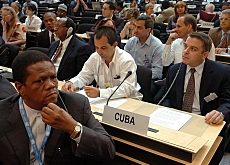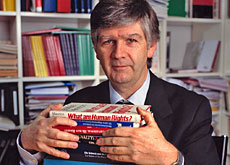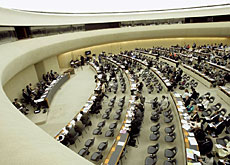Pressure remains on UN rights body

The under-fire United Nations human rights watchdog faces further scrutiny over the next three weeks as its fourth session begins in Geneva.
On Monday a report commissioned by the Human Rights Council accused Sudan’s government of orchestrating and participating in “large-scale” international crimes in Darfur.
Swiss President Micheline Calmy-Rey, who spoke at the opening of the session, said human rights in Darfur were being violated on a daily basis.
“The situation in Darfur is a matter of grave concern,” she said. “The conflict not only continues but gets worse by the week.”
The session will also hear reports on abuses in the Gaza Strip, as well one from a Swiss human rights expert on the “forgotten crisis” in the Central African Republic.
The Human Rights Council, which stems from a Swiss initiative, has endured a tough baptism since it met for the first time in June last year.
The political splits that led to the paralysis and demise of its widely discredited predecessor, the Human Rights Commission, refuse to go away.
Last week the United States, which is not a member, said it would not be seeking a seat on the 47-strong body because it did not deem it “credible”.
Washington chided the council for having a “singular focus” on Israel, while countries such as Cuba, Myanmar and North Korea had been spared scrutiny. Israel has been singled out on at least three occasions.
On Friday a senior European Union official said Brussels’ patience was also wearing thin.
Too early to judge
But Swiss law professor Walter Kälin, who drew up the blueprint for the council, says criticism is premature and that judgement should be reserved until the way the body will function has been properly defined. This should be completed by June.
“The council has still not finished the task of setting up the relevant procedures, and as long as this is not done the council cannot be fully operational and that’s affecting its effectiveness,” Kälin told swissinfo. “For me, it’s too early to say that it lacks credibility.”
Amnesty International takes a similar view, but warns that a way has to be found to break the intransigence of regional blocs.
“You cannot say that the council is doomed to failure,” said spokesman Peter Splinter. “But many problems remain to be resolved and time is starting to run out.”
Central African Republic
During the session Kälin, who is the UN secretary-general’s representative on the human rights of internally displaced people, will present a preliminary report outlining “serious human rights violations” in the Central African Republic.
The Bern University law professor, who returned from a fact-finding trip earlier this month, said up to 200,000 people had fled their homes in the northwest of the country because of fighting between the government and rebels.
“There are entire stretches of land where 100 per cent of the population has been displaced,” he said. “They are living in forests in fear and in utmost destitution, with no access to drinking water or medical aid and with insufficient humanitarian assistance.”
Kälin added that the army was systematically burning down villages in the region, preventing families from returning home. Another problem was that those committing human rights abuses were not being held to account.
Yet he said the problems were far from insurmountable, adding that a great deal could be achieved simply by increasing the presence of humanitarian agencies on the ground.
Agenda
Human rights reports on Burundi, Liberia, the Democratic Republic of Congo, Myanmar, North Korea and the Palestinian territories will also be heard over the next two weeks.
In addition the council’s high-level missions to Sudan’s Darfur region and the Gaza Strip will present their findings.
Sudan’s refusal last month to allow the mission to visit Darfur – where more than 200,000 have died – was condemned last week in Geneva by the UN High Commissioner for Human Rights, Louise Arbour.
She called on the council to take action against countries that refused to cooperate in future.
Another council mission – led by South African Nobel laureate Desmond Tutu – to investigate the deaths of 19 civilians killed by Israeli shells in the Gaza town of Beit Hanoun was cancelled in December after Israel blocked the visit.
swissinfo, Adam Beaumont with agencies
The council meets at least three times a year for a minimum of ten weeks.
It can call emergency special sessions to respond to crises.
Switzerland was elected to the council with a three-year mandate in May last year.
The session runs until March 30.

In compliance with the JTI standards
More: SWI swissinfo.ch certified by the Journalism Trust Initiative


You can find an overview of ongoing debates with our journalists here. Please join us!
If you want to start a conversation about a topic raised in this article or want to report factual errors, email us at english@swissinfo.ch.